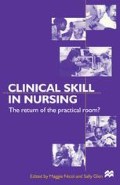Abstract
This chapter outlines an approach to the teaching and learning of clinical skills that forms an integral part of the overall clinical assessment strategy adopted in the BSc (Hons) Nursing pre-registration curriculum. Key values that have influenced the design and development of the clinical assessment strategy and tools are discussed, together with development work currently being undertaken in translating these into action. The search for a suitable model and strategy for teaching, learning and assessing nursing students in practice is briefly discussed, as is an outline of the model which is currently being tested. A key tool designed for formative assessment is the Portfolio, which includes a section for clinical skills learning. By adopting this approach, it is hoped that a balance between students ‘learning’ and ‘doing’ in practice can be achieved.
Preview
Unable to display preview. Download preview PDF.
References
Ace Project (1992) The Assessment of Competencies in Nursing and Midwifery Education and Training. Interim Report. Norwich: School of Education, University of East Anglia.
Alavi, C, Loh, S H and Reilly, D (1991) Reality basis for teaching psychomotor skills in a tertiary nursing curriculum. Journal of Advanced Nursing 16: 957–65.
Allen, C (1992) Foundations for success. Nursing Times 88(2): 20.
Argyris, C and Schön, D (1974) Theory in Practice: Increasing Professional Effectiveness. Mass.: Addison Wesley.
Bedford, H, Robinson, J, Schostak, L and Phillips, T (1994) Education, Dialogue and Assessment: Creating Partnership for Improving Practice. London: ENB.
Butterworth, T (1994) Working in Partnership: A Collaborative Approach to Care. Report of the Mental Health Nursing Review Team. London: HMSO.
Coates, V E and Chambers, M (1992) Evaluation of tools to assess clinical competence. Nurse Education Today 12(2): 122–9.
English National Board for Nursing, Midwifery and Health Visiting (1995) Changes to the Regulations and Guidelines for the Approval of Institutions and Courses. Section 5: Regulations and Guidelines Relating to Assessment. London: ENB.
Fretwell, J (1980) An Enquiry into the Ward Learning Environment. Nursing Times Occasional Paper 76(16): 69–75.
Jowett, S, Walton, I and Payne, S, (1992) Implementing Project 2000 — An Interim Report. Slough: NFER.
Leonard, A and Jowett, S (1990) Project 2000: Charting the Course. A Study of the Six ENB Pilot Schemes in Pre-registration Nurse Education. Slough: NFER.
May, N, Veitch, L, McIntosh, J and Alexander, M (1997) Preparation for Practice: Evaluation of Nurse and Midwife Education in Scotland. Edinburgh: National Board for Scotland.
Ogier, M (1982) An Ideal Sister?: A Study of Leadership Style and Verbal Interactions of Ward Sisters with Nurse Learners in General Hospitals. London: RCN.
Orton, H D (1981) Ward Learning Climate: A Study of the Role of the Ward Sister in Relation to Student Nurse Learning on the Ward. London: RCN.
Orton, H D (1993) Learning Climate Project. Sheffield: Health Research Centre, Sheffield Hallam University.
Patel, V L and Groen, G J (1991) The general and specific nature of medical expertise, a critical look. In Anders Ericson, K. and Smith, J (eds) Towards a General Theory of Expertise, Prospects and Limits. Cambridge: Cambridge University Press.
Phillips, T, Bedford, H, Robinson, J and Schostak, L (1994) Education, Dialogue and Assessment: Creating Partnership for Improving Practice. London: ENB.
Reilly, D E and Oermann, M H (1985) The Clinical Field; Its Use in Nursing Education. Norwalk: Appleton-Century-Croft.
Robinson, J (1991) Project 2000: the role of resistance in the process of professional growth. Journal of Advanced Nursing 16: 820–4.
Royal College of Nursing (1993) Teaching in a Different World — An RCN Discussion Document. Framework for the Future Preparation of Teachers of Nurses, Midwives and Health Visitors. London: RCN.
Studdy, S J, Nicol, M J and Fox-Hiley, A (1994) Teaching and learning clinical skills. Part 2: Development of a teaching model and schedule of skills development. Nurse Education Today 14: 186–93.
Wilson-Thomas, L (1995) Apply critical social theory to nurse education to bridge the gap between theory, research and practice. Journal of Advanced Nursing 21(3): 568–75.
Editor information
Editors and Affiliations
Copyright information
© 1999 Isabelle Whaite, Rose Allen and Dorothy Jones
About this chapter
Cite this chapter
Whaite, I., Allen, R., Jones, D. (1999). A Portfolio Approach. In: Nicol, M., Glen, S. (eds) Clinical Skills in Nursing. Nurse Education in Practice . Palgrave, London. https://doi.org/10.1007/978-1-349-14724-3_6
Download citation
DOI: https://doi.org/10.1007/978-1-349-14724-3_6
Publisher Name: Palgrave, London
Print ISBN: 978-0-333-72614-3
Online ISBN: 978-1-349-14724-3
eBook Packages: MedicineMedicine (R0)

